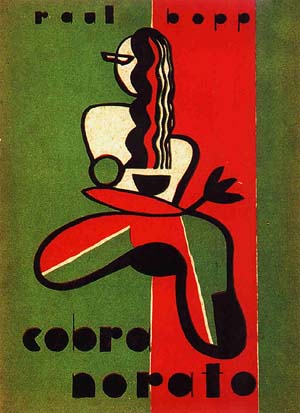Raul Bopp: Cobra Norato (1931–) [BR-PT, EN]
Filed under poetry | Tags: · anthropophagy, avant-garde, brazil, modernism, poetry

“Raised in the south of Brazil, trained as a lawyer in Recife and Rio, and seasoned as a diplomat in Japan and the United States, Raul Bopp found his true subject in Manaus, where he discovered what he insisted was the authentic Brazil. Bopp brought to the early Modernist movement in Brazil a fascination with the folklore, Indian languages, and culture of the vast hinterland of the Amazon basin. As a contributor to the magazine Revista de Antropofagia (Anthropophagical Review) in the 1920s and 1930s, Bopp defined the concerns of what he called the “Cannibalist school” of poetry. ‘Anthropophagical’ in their appropriative and assimilative relation to European experimental writing, the theories of Bopp and Oswald de Andrade further associated them with the tenets of the cosmopolitan/indigenist “Verde e Amarelo” writers, who took their name (“The Green and Yellow”) from the colors of the Brazilian flag.
His long poem Cobra Norato (The Snake Norato or, as translated by Renato Rezende, Black Snake) was written in 1928 and published in its first version in 1931. In it Bopp embodies his primitivist, mystical sense of the life of Brazil’s interior, whose energy he and the other “Cannibalists” proposed as an alternative to the compromising forces of modern urban life. Skeptical, impressionistic, rhythmically complex, and erotically playful, the poem moves at times like a dream or a fairy tale. Its politics, however, are humanitarian and ecologically alert to the dangers o fexploiting the rain forest and its indigenous cultures. In later editions, Bopp softened the bluntness and difficulty of the poem’s diction, making the tone less austerely visionary and more tender. In his later poems, in his criticism, and in his several volumes of memoirs, Bopp continued his Modernist advocacy of Amazonian and Afro-Brazilian folklore as sources of energy and psychic survival.” (Source)
First published in Rio de Janeiro, 1937.
Cobra Norato / Black Snake (BR-Portuguese/English, trans. Renato Rezende, 1996, excerpts, HTML)
Cobra Norato (English, trans. Chris Daniels, 2008)
Leave a Reply

